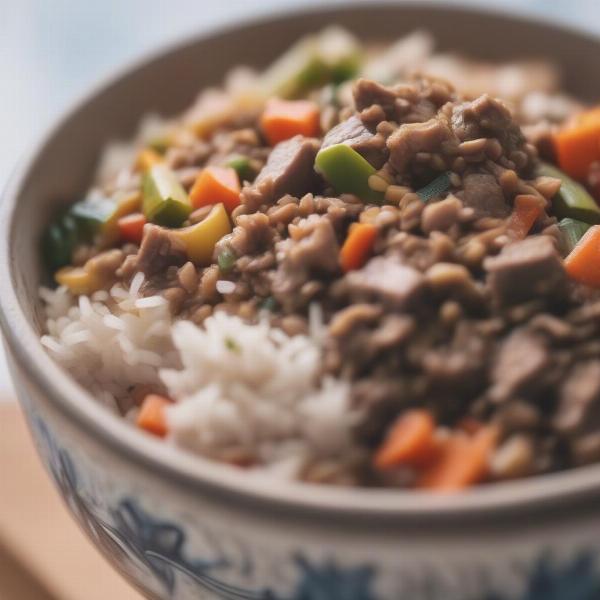Rice and lamb dog food is a popular choice for pet owners seeking a palatable and easily digestible option for their furry friends. But is it the right choice for your dog? This article will delve into the benefits and drawbacks of rice and lamb dog food, helping you make an informed decision about your dog’s nutrition. We’ll explore everything from the nutritional value of these ingredients to potential allergy concerns and how to choose the best rice and lamb formula for your dog’s specific needs.
Understanding the Benefits of Rice and Lamb in Dog Food
Lamb is a highly digestible protein source, making it a good choice for dogs with sensitive stomachs. It’s also a rich source of essential amino acids, crucial for building and repairing tissues. Rice, on the other hand, is a carbohydrate that provides energy and is gentle on the digestive system. Combined, these ingredients offer a balanced nutritional profile that can be beneficial for many dogs. Furthermore, lamb is often considered a novel protein, meaning it’s less likely to trigger allergies in dogs who are sensitive to common proteins like chicken or beef. This makes rice and lamb dog food an excellent option for dogs with food allergies or intolerances. It’s important to note, however, that not all rice and lamb formulas are created equal.
Choosing the Right Rice and Lamb Dog Food
When selecting a rice and lamb dog food, look for a formula that lists lamb as the primary ingredient. This ensures that your dog is receiving a sufficient amount of high-quality protein. Check the ingredient list for fillers like corn, wheat, and soy, which can be difficult for some dogs to digest and offer little nutritional value. Instead, opt for whole grains like brown rice, which provide fiber and essential nutrients. Furthermore, consider your dog’s life stage and activity level. Puppies and highly active dogs require more calories and protein than senior dogs or those with a more sedentary lifestyle. Choose a formula that meets their specific needs.
Addressing Potential Concerns: Allergies and Grain-Free Diets
While lamb is generally considered hypoallergenic, some dogs may still be allergic to it. If you suspect your dog has a food allergy, consult your veterinarian. They can perform tests to identify the allergen and recommend an appropriate diet. Regarding grain-free diets, it’s important to understand that grains themselves are not inherently bad for dogs. In fact, they provide valuable nutrients. However, some dogs may have sensitivities to specific grains like wheat or corn. Rice, however, is usually well-tolerated. If you choose a grain-free option, ensure it’s formulated by a reputable brand and provides complete and balanced nutrition.
Is Rice and Lamb Dog Food Right for My Dog?
Rice and lamb dog food can be an excellent choice for many dogs, particularly those with sensitive stomachs or allergies. However, every dog is an individual. What works for one dog may not work for another. Always monitor your dog’s health and consult your veterinarian if you have any concerns about their diet. They can help you determine if a rice and lamb formula is the right choice for your furry friend.
Homemade Rice and Lamb Dog Food: A Nutritious Option?
While commercially available rice and lamb dog food is convenient, some pet owners prefer to prepare homemade meals for their dogs. While this can be a rewarding experience, it’s crucial to ensure the diet is nutritionally balanced. Consult with a veterinary nutritionist to create a recipe that meets your dog’s specific needs. An unbalanced homemade diet can lead to nutritional deficiencies or excesses, which can have serious health consequences for your dog.
 Homemade Dog Food with Rice and Lamb
Homemade Dog Food with Rice and Lamb
Conclusion
Rice and lamb dog food can be a healthy and delicious option for your canine companion, particularly if they have digestive sensitivities or allergies. By choosing a high-quality formula and monitoring your dog’s health, you can ensure they receive the nutrients they need to thrive. Remember to consult your veterinarian if you have any questions or concerns about your dog’s diet.
FAQ
- Is rice and lamb dog food good for puppies? Yes, there are rice and lamb formulas specifically designed for puppies, providing the extra nutrients they need for growth.
- Can senior dogs eat rice and lamb dog food? Absolutely! It’s a digestible option that can be easier on their aging digestive systems.
- What are the signs of a lamb allergy in dogs? Common signs include itchy skin, digestive upset, and ear infections.
- Is brown rice better than white rice in dog food? Brown rice is generally preferred as it’s less processed and contains more fiber.
- How much rice and lamb dog food should I feed my dog? Follow the feeding guidelines on the packaging and adjust based on your dog’s weight, activity level, and overall health.
- Can I mix rice and lamb dog food with other foods? It’s best to consult your veterinarian before mixing dog foods to ensure a balanced diet.
- Where can I buy high-quality rice and lamb dog food? Reputable pet stores and online retailers often carry a wide selection.
ILM Dog is your trusted resource for all things dog-related. We offer expert advice on dog breeds, health, training, nutrition, grooming, and much more. From choosing the perfect breed to navigating the complexities of canine nutrition, ILM Dog provides the information you need to make informed decisions for your furry friend. Contact us at [email protected] or +44 20-3965-8624.